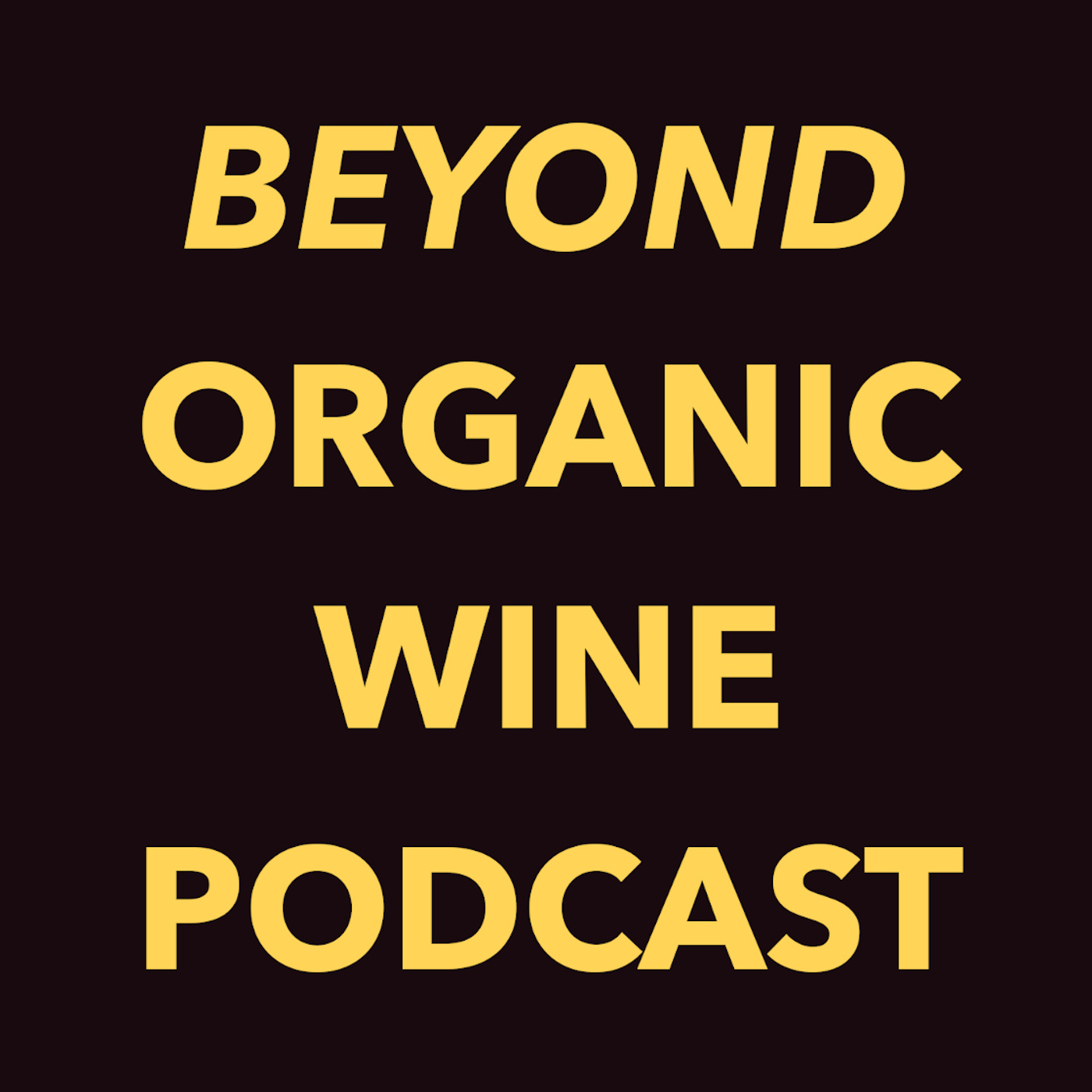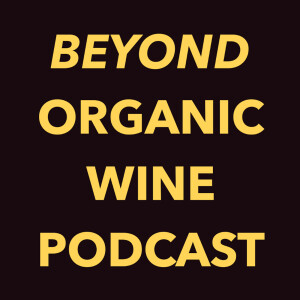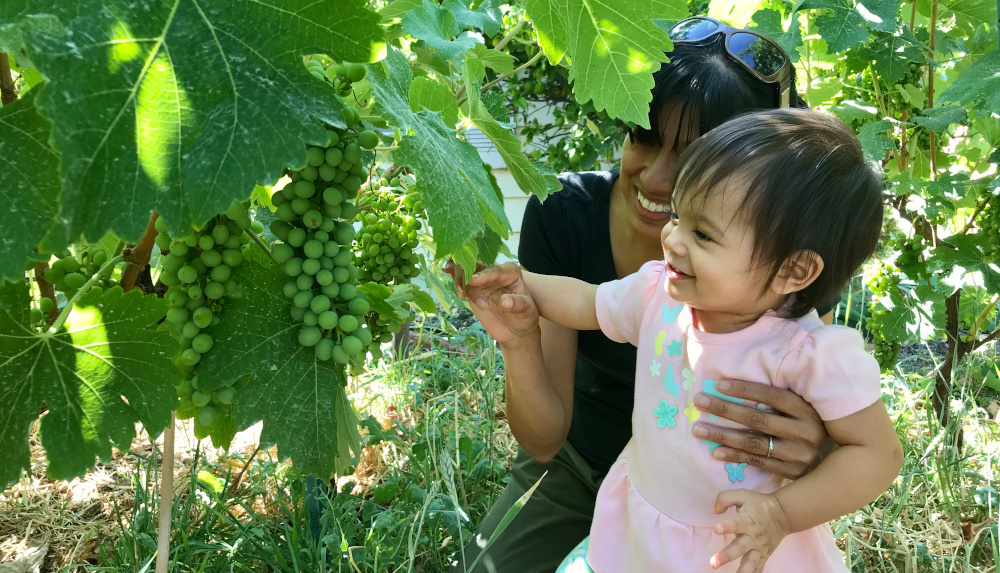
190.8K
Downloads
199
Episodes
Organic Wine is the gateway to explore the entire wine industry - from soil to sommeliers - from a revolutionary ecological perspective. Deep interviews discussing big ideas with some of the most intriguing people on the cutting edge of the regenerative renaissance, about where wine comes from and where it is going.
Episodes

Thursday Oct 24, 2024
Death In The Vineyard, Part 2 - The Angels' Share & The Ecology of Fear
Thursday Oct 24, 2024
Thursday Oct 24, 2024
Do humans have a vole infestation or do voles have a human infestation? This and other questions from this episode may haunt your dreams and have you wondering if maybe "regenerative winegrowing" is an oxymoron.
The big question of Part 2 of the Death In The Vineyard mini-series is "What are the regenerative solutions to all the things that want to eat our wine crops?"
In trying to answer this question Part 2 looks at the cultural assumptions, language, beliefs, and prejudices that inform the way we currently see and relate to all of the lives that feed on our vines and trees.
Get ready to take a wrecking ball to your ideas about Integrated Pest Management, not to mention your assumptions about snakes.
Additionally, you'll get a list of practical tactics for preventing or stopping vole infestations or other plagues of rodents.
Don't listen to this episode unless you're ready to be a global leader in regenerative winegrowing and regenerative agriculture in general.
This episode and the others in this series took a lot of work to produce. If you'd like to support or sponsor them financially, this would be incredibly helpful to enabling me to continue to do this kind of investigating and reporting.
You Can Support this podcast by subscribing via patreon.
Or by donating or taking action at:

Monday Sep 30, 2024
Madson Wines - Beyond Organic in the Santa Cruz Mountains
Monday Sep 30, 2024
Monday Sep 30, 2024
In this episode I get to talk to Abbey Chrystal, Ken Swegles & Cole Thomas of Madson Wines and Rhizos and Skyline Viticulture and a few other ventures.
If you haven’t heard of the Santa Cruz Mountains AVA, you’re about to be introduced to a wine region unlike any other. I didn’t realize how special it was until Abbey, Ken, and Cole began describing it, and they may know it better than anyone else because between them they farm, make wine, and sell wine from up to over 50 vineyards around the AVA and have initiated transitions to better than organic farming on many area vineyards.
The Madson Wines website says, “As a standard, all of the vineyards that we work with have been converted to 100% organic practices. We use only ecologically based pest controls and biological fertilizers including animal waste and nitrogen fixing cover crops to help regulate and maintain the health of soil microbes. Many of our vineyards were not organic prior to our adoption; we find that motivating vineyard owners to adopt organics is more rewarding than merely searching for growers who already understand its value. However, organic agriculture does not encompass all of the solutions for responsible agriculture. We must explore beyond the organic system to maintain and improve our surrounding ecosystems and communities.” It then goes on to talk about their goal to practice regenerative viticulture in an effort to help their farming evolve with the changing climate and mitigate the effects of climate change.
In addition to these very admirable farming values, these guys are kind, generous, and compassionate people with lots to share.
https://www.rhizosconsulting.com/+
You Can Support this podcast by subscribing via patreon.
Or by donating or taking action at:

Monday Sep 23, 2024
Monday Sep 23, 2024
We’re going back to Michigan for this episode to talk to Andrew Backlin, the production mangager / winemaker of Modales Wines in Fenville, Michigan. You may have heard Andrew’s voice already if you listened to the first part of my special Death In the Vineyard series.
Andrew introduced me to a little known fact outside of Michigan. Michigan farmers produce over 300 different kinds of crops, making Michigan the second most agriculturally diverse state in the US… after only California.
Andrew tells the story of Modales’ transition from conventional wine production just four years ago, to fully organic for the last three years and now certified… growing mostly vinifera. Their vineyard went from dead, round-up nuked hardpan with basically zero organic matter, to living, thriving, healthy soils with worms and a 400% increase in organic matter. You can hear in his voice and enthusiasm that his participation in regenerating this ecosystem has lit him up, and it’s infectious.
On the other hand, he also doesn’t shy away from mentioning the big problems that still face winegrowers who want to do the right thing but who have inherited a large investment in vinifera in a temperate, humid climate that was made possible by chemistry.
I want to mention just one of those issues as a call to action. Andrew at one point mentions the fact that because something like 95% of the wine in the US comes from the west coast where we don’t face problems like black rot, very little research and investment has gone into organic controls for black rot specifically, and it is the main Achilles heel of organic viticulture in humid climates. While I of course think grape breeding should be a primary effort to solve this and other fungal issues, the reality is that many hybrids also have issues with black rot, and there are very few hybrids that can tolerate this fungus in very wet years. And Andrew brings up several other great points about why better organic sprays are necessary given the current wine culture… unless the USDA wants to invest millions of dollars on marketing to create a new wine culture that’s not chauvinistic toward hybrids.
Come to think of it, the USDA could sponsor this podcast to help with that effort….
A few other important things to know about Andrew… he’s a California native who moved to Michigan for wine. He gave me the inspiration and gentle kick in the butt to create the Beyond Organic Wine google group for anyone who is learning and trying to farm and make wine in more ecological, better than organic ways … and if you’d like to join, just log into google go to groups and search beyondorganicwine all one word with no spaces and ask to join. It’s a low key vibe community… no one is trying to sell anything, but we’re there when you have questions or important discoveries to share… and the more the merrier, healthier, and better at farming and winemaking we will be. So we hope to connect with you there.
Finally, I have tried Andrew’s wines and I they are wines I can’t wait to buy again, and not just because I want to support their leadership in Michigan organic viticulture. They are delicious, diverse, and interesting. Andrew makes what he calls “natural wines that you don’t know are natural” for Modales. He has some classic cool-climate single variety wines, as well as some blends of vinifera and hybrids, sparkling and orange. And if you’d like to try them or, in my case, re-try them, Modales has created a 20% discount code that is good until the end of the year. The code is MODALESBOW20 for 20% off wine purchases until the end of 2024.
And you can purchase those wines at Modaleswines.com
Now the one catch is that because of Michigan’s protectionist and litigious stance on interstate wine commerce, shipping is only available for those of you who live in Michigan, Ohio, Indiana, Illinois, Florida, Arizona. The rest of us just need to go visit… apparently Michigan is worth the trip.
As Andrew talks us through both the hopes and the realities of transitioning to organic vinifera viticulture in his climate, there’s as much to learn as be inspired by. Enjoy.
Michigan is the #2 farming state in diversity of crops
https://farmflavor.com/michigan/michigan-farm-to-table/diversity-of-michigan-agriculture/
You Can Support this podcast by subscribing via patreon.
Or by donating or taking action at:

Monday Sep 16, 2024
Death In The Vineyard - Part 1: Sympathy For Vole d'Mort
Monday Sep 16, 2024
Monday Sep 16, 2024
I experienced a vole infestation in a vineyard for the first time, and it has devastated my understanding of regenerative viticulture. In this first of a multi-part series called Death In the Vineyard, I talk to experts and winegrowers from all over the US about this adorable little creature, the vole, and the massive impact it has had historically and ecologically in our wine landscapes. As I follow the threads of truth that unravel before the voracious voles, they reveal some gaping holes in the fabric of our regenerative ideology. This episode and the ones to follow in this mini-series will question some of your most cherished beliefs and ideals about regenerative wine. If the regenerative movement is to survive, I believe we need to begin answering the questions that voles are asking of us.
This episode and the others in this series took a lot of work to produce. If you'd like to support or sponsor them financially, this would be incredibly helpful to enabling me to continue to do this kind of investigating and reporting.
You Can Support this podcast by subscribing via patreon.
Or by donating or taking action at:

Sunday Sep 08, 2024
Hebron Vineyard - Regenerative No-Spray Vitiforestry in Wales
Sunday Sep 08, 2024
Sunday Sep 08, 2024
“Thinking like a vine,” is a motto that Paul Rolt and Jemma Vickers of Hebron Vineyard in Wales, UK farm by. Hebron Vineyard is the first vineyard in Wales — and the UK — to be Certified Regenerative by A Greener World (AGW). Paul and Jemma use no sprays or off-farm inputs to grow their vines – zero zero farming which preceeds the same kind of zero zero, raw and living winemaking. To do this they focus on creating optimal health and growing conditions for their Rondo and Solaris piwi varieties of grapes by using what is available on site. In considering what might be optimal for a vine, they implemented an arbustrum and have grown vines for four years in a living willow tree trellis system. The design of this system is ingenious and inspired by ancient practices. Willow has unique advantages both below and above ground, and Paul and Jemma’s vineyard is just one of the many styles of vitiforestry that showcase the deep and multi-layered benetfits of married vine polycultures.
The biggest critique that I can imagine for this kind of approach to wine growing is that it can’t be commercial because some years you won’t get a crop. When I asked Paul and Jemma about the problems of farming wine this way, they admitted they have limits. They know them and know they must work within them. That’s very different than the persptive that sees limits as problems that must be overcome by any means necessary, though. Both of those mindsets have consequences. In Paul and Jemma’s case they have prioritized ecological and psychological health, beauty and biodiversity, family and quality of life, and long-term resilience and independence.
@hebronvineyard
https://www.hebronvineyard.com/
You Can Support this podcast by subscribing via patreon.
Or by donating or taking action at:
Sponsor:

Monday Sep 02, 2024
Dave Bos - Bos Wines & Michigan Biodynamics
Monday Sep 02, 2024
Monday Sep 02, 2024
An epic conversation with David Bos of @BosWine in Michigan, so I’m going to keep this intro short. Dave is a fantastic ambassador for Michigan wine, and yet he spent more than a decade growing and making wine organically and biodynamically in Napa Valley first. So his enthusiasm seems well informed, and I hope you find it as infectious as I did. Seen through Dave’s eyes, Michigan sounds pretty exciting. Even more importantly to me Dave is a fantastic ambassador for biodynamic and organic viticulture, so this conversation is LOADED.
You Can Support this podcast by subscribing via patreon.
Or by donating or taking action at:
Sponsor:

Sunday Aug 18, 2024
Gut Oggau - Eduard & Stephanie Tscheppe
Sunday Aug 18, 2024
Sunday Aug 18, 2024
I’m delighted to share this conversation with Eduard and Stephanie Tscheppe of Gut Oggau in Burgenland in Austria. 17 years ago they started making decisions about how to farm and make wine that were not popular or even understandable to most of the wine world. It was a huge risk, maybe even a little foolish, and because of it, I don’t think it’s an exaggeration to say, they became one of the most loved and respected natural wine brands in the world, with unique approaches to nearly everything they do with wine. We talk about biodynamics, high density vine plantings, the magic of farming with horses, the creation of culture as agriculteurs, wine personalities, hybrids and ecological approaches to grape growing, planting trees and other perennials in, between, and around vines, making wine the same way the wine is farmed, the price and the cost of wine, the beauty of diversity, and so much more.
@gutoggau
You Can Support this podcast by subscribing via patreon.
Or by donating or taking action at:
Sponsor:

Sunday Jul 28, 2024
Shelby Perkins - Nuclear Wine
Sunday Jul 28, 2024
Sunday Jul 28, 2024
Shelby Perkins farms grapes beyond organically in the Eola-Amity Hills of Oregon's Willamette Valley, and makes thoughtful wines of place. And speaking of thoughtful, Shelby seems to have lived several lives already. In one life she worked for the US Department of Energy doing technical research related to nuclear weapons and waste clean up. She was also once Science Policy Fellow at the National Academies, examining climate geoengineering. A trip to Antarctica changed her life and she began her life in wine and uncertainty and living in the outdoors. We talk about terrorist squirrels, climate change, what's going on behind the curtain, nuclear energy, growing grapes with voles, what to do about voles in the vineyard, renewable energy, biodynamic and organic viticulture, craving failure, how farming will kick your ass and save you, and how to transition from being a warrior to being an artisan. There's so much in this conversation because Shelby is a special person with a beautiful mind.
https://www.perkinsharter.com/philosophy
You Can Support this podcast by subscribing via patreon.
Or by donating or taking action at:
Sponsor:

Monday Jul 15, 2024
Land As A Living Being - Robin Snowdon, Limeburn Hill Vineyard
Monday Jul 15, 2024
Monday Jul 15, 2024
It’s my pleasure to present this conversation with Robin Snowdon of Limeburn Hill Vineyard. Limeburn Hill Vineyard is an innovative, ecological vineyard near Chew Magna on the edge of Bristol. It is the only biodynamic vineyard in the south west of England, and one of only a handful in the UK. In addition to farming biodynamically, Robin and his partner Georgina Harvey have a vision of their farm as a nature preserve, and really want to approach the land as a living being that we can care for and also connect with. Robin talks of dancing grasses and trees and vines trellised at a height that little sheep can graze beneath, with foxes and rabbits and a vineyard full of wildflowers, and the attempt to build the system only with what grows naturally. He discusses having an intuitive, emotional connection with the land and our opportunity as farmers help it achieve its greatest potential. He talks about how integrating ruminants brings joy to the land and those who visit it, and how that joy translates into the wine. They’re growing some really interesting grapes, some hybrids that we don’t have here in the US. We talk about their winemaking and how their approach to not letting anything go to waste results in some really interesting approaches to wine... And how small is beautiful and sustainable in an approach to a wine business.
https://limeburnhillvineyard.co.uk/
@limeburnhill
You Can Support this podcast by subscribing via patreon.
Or by donating or taking action at:
Sponsor:

Wednesday Jul 03, 2024
Wine As Art - Ariana Ross
Wednesday Jul 03, 2024
Wednesday Jul 03, 2024
I’m really excited to share a conversation I had with Ariana Ross, a certified sommelier and the author of the book: Wine’s Way To Art: A Treatise on Wine as Art and Why Art is Something We Need to Be Human. It is such a pleasure to talk with Ariana because she has the unusual ability to entertain ideas and argue a perspective without getting her ego involved. Conversation is a tool that she uses to hone her own thinking and to move further down the path in the pursuit of truth. Because of that I could talk to her for hours, so this discussion feels to me like just the beginning of a much bigger conversation.
We delve into some pretty juicy topics including elitism in wine: how to separate that from expertise and acquired tastes and reverence, as well as questioning the idea of higher pleasures. We also ask whether it’s appropriate to refer to wine as art, and what it means for wine to be approached as an art. Among many questions discussed and unanswered, we discuss the importance of the canon of wine (one n, not two, as in the prime examples and archetypes) and whether a canon exists for other types of wine besides the commonly understood European grape wine. We don’t always agree, and that’s the fun of it…Ariana allowed us to explore these perennially important ideas through her book, which seems extremely timely, and the result was a dynamic and candid exchange that has left me looking forward to the next conversation.
@thesimplesomm
You Can Support this podcast by subscribing via patreon.
Or by donating or taking action at:
Sponsor:
